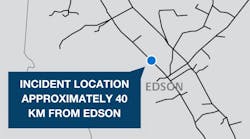By Kate Thomas
OGJ Online
HOUSTON, Feb. 23�In a downbeat assesment of the Illinois power market, the chairman of the Illinois Commerce Commission warns without more supply alternatives consumers will be subject to prices charged by companies with "very substantial market power."
To date, says Richard L. Mathias, most observers agree little competition has developed in the state outside Chicago-based Commonwealth Edison Co.'s (ComEd) service territory, and some are unwilling to conclude competition exists in ComEd's territory.
Mathias says more conservation and compensated load curtailment needs to occur in Illinois to slow the rate of electric demand. Moreover, he says, transmission constraints within the state and into and out of Illinois need to be corrected "if there is to be effective wholesale and retail competition."
The Chicago metropolitan area appears to be a "load pocket" with limited import capability in the summer, he says. Further, defections from the Midwest Independent System Operator to the Alliance Regional Transmission Organization will bifurcate the governance of the state transmission system and likely lead to a dysfunctional system, Mathias says.
"No company will commence the long process of acquiring the land and permits and designing and building a generating facility, unless assured of being able to transmit electricity to specific targeted location," he says. "Whoever controls the desirable routes and landing slots [for airplanes]�or the transmission lines�has a choke hold on competition."
Comparing the 1997 Illinois law restructuring electricity to California's, Mathias warns similarities exist that helped drive two of California's largest utilities to the brink of bankruptcy. Until 2004, the risks of price fluctuations are borne by the Illinois electric utilities. Mathias observes the risk is quite similar to the risk structure in California.
Like California, the Illinois Customer Choice Law caps retail rates, but there is no cap on wholesale prices. Under Illinois law all customer rates are frozen until at least Jan. 1, 2005. It also provides that 80-85% of Illinois utilities' residential customers receive a 20% rate decrease.
California differences
But unlike California, Illinois generators can use various risk management arrangements, including long-term contracts, not available to California utilities. After 2004, electricity customers are subject to the "whims of the market and the marketers," Mathias says.
The commission will have little direct authority over generating companies that are selling power to the vestiges of electric utilities, which in most instances will become distribution or 'wires' companies.
Unregulated affiliates of Illinois utilities will be free to sell electricity to affiliated utilities and to unrelated third parties at market rates. Compared to California, says Mathias, Illinois utilities have simply transferred generating capacity to affiliates. In California, the utilities were forced to sell most of their generating capacity to third parties.
Despite the differences between the two states' approach to electric competition, to avoid a California-style debacle, Mathias warns Illinois supply and demand, including base load and peaking power, must not become imbalanced.
To avoid power shortages, he says, "the very real fears" of opponents of power plants must be accommodated, as well as recognition of the need to build more generating capacity to improve electric reliability and forestall the need for more transmission lines.
Illinois built in a longer transition period than California, Mathias notes, but it doesn't guarantee the road will be smoother. He says Illinois can learn from its own and other's errors, undertaking corrective action when necessary to avoid problems of its own making.
